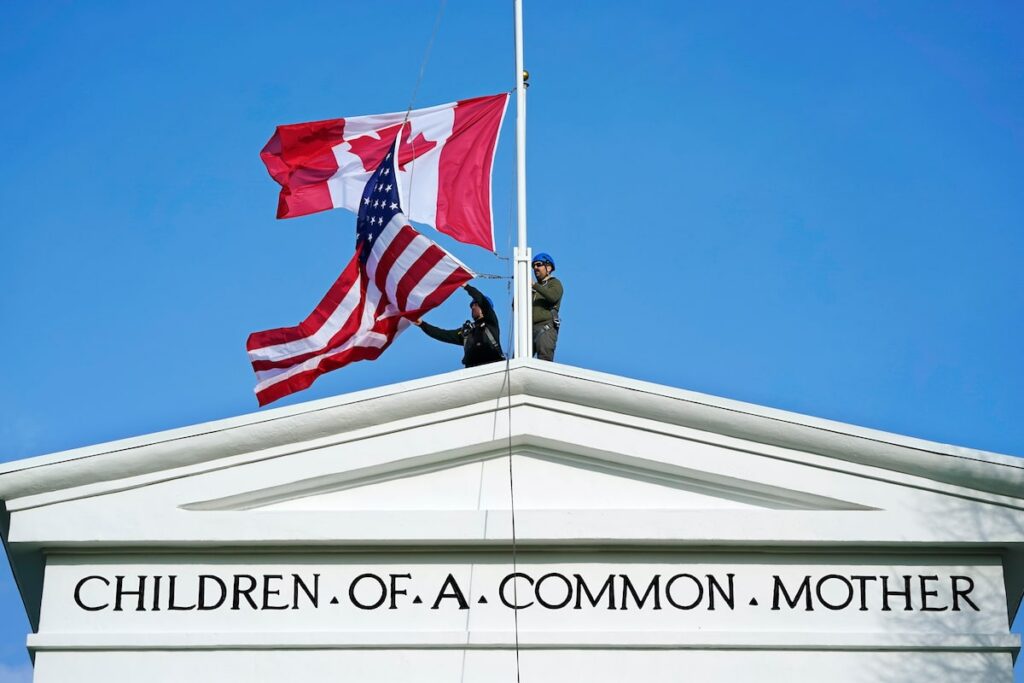Open this photo in gallery:
Canada's innovative strength has led to one of the most stable and transparent investment environments in the world, but recent policy changes have some U.S. companies and investors considering whether Canada is still a good place to invest. Elaine Thompson/Associated Press
Neil Herrington is senior vice president for the Americas at the U.S. Chamber of Commerce.
Canadian concerns about plummeting domestic economic output and declining investment levels have not gone unnoticed in the U.S. The concerns expressed by Bank of Canada officials come at a time when U.S. companies that have operated in Canada for decades are themselves asking tough questions about whether Canada remains an attractive investment destination.
Canada has a long culture of innovation that has given the world some of its greatest inventions, including insulin, sonar, the pacemaker and the telephone. At the heart of Canada's innovative power is one of the most stable and transparent investment environments in the world. But recent policy missteps have undermined that sense of security.
When Parliament returns in the fall, a course correction is what is most needed. Indeed, Canada's economic prosperity, the Canada-U.S. trade relationship, and even our shared security may depend on it.
The Canadian government's long-running threat to impose a unilateral digital services tax (DST) on big technology companies reached a key milestone on Wednesday when the Senate passed the DST bill.
This is despite ongoing multilateral efforts led by the Organisation for Economic Co-operation and Development (OECD) and the G20 to address tax challenges arising from the digitalisation of the economy. Canadian officials have repeatedly asserted that they support the multilateral process, but their actions speak louder than words. Last July, Canada was one of five countries to vote against an OECD/G20-brokered agreement (supported by 138 other countries) to extend the suspension of DST for businesses for another year.
Meanwhile, in Washington, there are voices from the Biden administration and both parties in Congress who say unilaterally imposing DST would violate Canada's obligations under the United States-Mexico-Canada Agreement (USMCA) and would lead to retaliatory U.S. measures.
“We don't understand why Canada would risk an economic dispute with its most important trading partner on this issue. Not only would this measure be insignificant from a revenue perspective, we believe it could stifle our country's innovation environment by allowing companies to pass on the tax, and impose new costs on Canadian consumers.”
Then there's the Online Streaming Act, passed last year, which requires foreign streaming providers to go beyond the investment they make in promoting Canadian content, which is determined by whether it's produced by a U.S. company, not the content itself.
Last week, the Canadian Broadcasting and Telecommunications Commission (CRTC) imposed a tax on content providers that likely violates Canada's USMCA obligations and will result in an additional $200 million in costs for Canadian consumers. While Canadians and Americans should welcome the showcase of Canada's rich Francophone and Indigenous traditions, the law is regulatory overreach and creates trade challenges. The law also threatens to undermine innovation in the creative arts in Canada if streaming providers withdraw from the domestic market as a result.
These measures would join other bills that American businesses have called into question, such as the Artificial Intelligence and Data Act, a framework for regulating AI systems introduced by the government in 2022, and the Online News Act, which would require digital platforms to compensate news companies when they make news content available on their platforms.
The move comes as the USMCA trio prepares for a mandatory review of the pact in 2026. Canada's Trade Minister Mary Ng said last week that the process should be a review, not a renegotiation. But in reality, the new trade irritants created by the Canadian government are only further fueling U.S. opponents who are already skeptical of the trio's commitment to upholding their obligations.
Giving impetus to those calling for a far-reaching overhaul of the agreement would evoke the anxious days of the 2017-2018 renegotiation of the North American Free Trade Agreement (NAFTA) and pose significant risks to the Canadian economy and an already fragile investment climate.
“The uncertainty that Canada's policies are creating for businesses is directly correlated with the sharp decline in Canada's output and investment. A course correction is necessary for both Canada's economic prosperity and North American security.”
“Whether it's supporting Ukraine and NATO on the battlefield, thwarting state-sponsored cybersabotage, or preventing the next pandemic, the democratic world desperately needs Canada's innovation capabilities, which only a healthy investment climate can ensure. Renewing Canada's innovation environment would not only go a long way to address the country's investment and production shortfalls, but it would also make us all safer in the process.”



